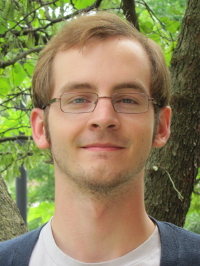2014 SRE Program Participant Profile: Brian Whyte

|
Hometown: Webster, NY |
Why did you apply to the SRE program?
It was relevant to both the research I've done before and the sort of work I want to get into in the future, and it was a great opportunity to make advancements in fields I had not had much experience with.
How did you hear about the program?
Found it online, on a list of internships offered by a university near my hometown (Rochester Institute of Technology).
What is the purpose of your research?
Argentine ants have somehow managed to make their way onto every continent around the globe (except Antarctica) and have become very dangerous to ecosystems around the world, where they damage biodiversity with their intense predation on native insects and wars waged against other ants in these ecosystems. Their success in predation and war is largely attributed to their extremely aggressive nature evolved in their South American home land, and to the cooperation they demonstrate in these massive groupings they form known as supercolonies.
Supercolonies are where ants from separate nests will somehow acknowledge each other as if they were nest mates, and cooperate as if one massive colony. In the habitats they invade, Argentine ants form incredibly large supercolonies, the largest stretching from Italy to western Spain. How ants in these supercolonies can somehow continue to recognize each other as allies under these conditions is hard to explain, so these supercolonies appear very unstable to us. Our project aims to explain this instability by building an evolutionary model for these supercolonies to show how these large groups could collapse over time after they invade an ecosystem and get too big.
![]()
It was fun to play my role of the ecologist while working with mathematically focused partners on some real research.
![]()
– Brian Whyte, SRE participant
What does the research ultimately accomplish? What contributions to science and/or humanity does the research ultimately make?
Social organisms often depend on the social groups they form for their survival, and when we encounter bizarre social systems like in the Argentine ants, our understanding of how these groups function in nature is improved not only by studying how they work, but also studying where and when they don't work.
Describe a typical day on the job.
I would meet with my group almost every day during the week. We worked near each other if not always with each other. We would bounce ideas off one another while trying to solve whatever problems our research faced at the time. Our mentors would occasionally drop by and give guidance, and as the days went by we just kept making great progress doing things this way.
Tell us something about your field of study we would be surprised to know.
I think for most people ecology seems to be a subject only concerned about environmental safety and stability, and while this is its greatest purpose, the study of organisms in the context of their environment goes beyond these concerns, offering insight into everything that has to do with living things. Their behaviors, their chemistry, and their origins: it all only makes sense in the context of their environment.
Do you have an interesting "personal side" to your research experiences that will increase human interest in your story?
There have always been odd but curious parallels between human nature and the nature of other social creatures, and ants can certainly be considered in this comparison. When doing this research I consider what is naturally unstable about these groupings of ants, held together by the treatment of strangers as if they were brothers or sisters, and I can't help but notice the parallels to human society, and this perspective makes our research more interesting to me, personally.
What were your favorite parts of the SRE program?
Travelling to the southern states after living up north all my life and getting along well with the other participants here made for an entertaining life outside of the program, and doing the research was exciting as well. I think this was precisely because it was collaborative and interdisciplinary.
It was fun to play my role of the ecologist while working with mathematically focused partners on some real research.
What new experiences did you gain that have helped you today?
Our project was based around a computer simulation which we coded from scratch in the R programming language, and I never had experience with programming beforehand, so for me this project involved learning a brand new skill that will likely come in handy for work I'll do in the future.
What advice would you give someone who's interested in/curious about participating in the program?
Don't worry about being under qualified. You don't have to be a pro at all the fields involved in these projects. You will work with people that have strengths where you have weaknesses, and one of the easiest ways to get the hang of a new discipline is to learn by doing.
Would you recommend our program to others?
Yes, for anyone who is looking to get experience doing both math and biology research.
What do you do outside of work (hobbies, sports, associations, activities)?
A lot of my time here was spent exploring what Knoxville had to offer with friends from the program, attending whatever events sounded interesting. Besides this I still had time for my usual hobbies; spending time outdoors, reading, and collecting music.
Where do you see yourself in 10 years?
Certainly teaching and researching ecology and evolution. Don't know where or how, there are plenty of ways, but I expect it to be fun.
NIMBioS
1122 Volunteer Blvd., Suite 106
University of Tennessee
Knoxville,
TN 37996-3410
PH: (865) 974-9334
FAX: (865) 974-9461
Contact NIMBioS


